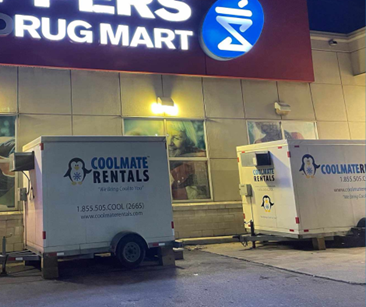In the pharmacy industry, temperature control isn’t optional—it’s essential. From vaccines and insulin to biologics and specialty medications, pharmaceutical products must be stored at precise temperatures to maintain their potency and safety.
However, investing in permanent refrigeration units isn’t always the best or most cost-effective solution, especially when facing temporary needs, emergencies, or business growth. That’s where refrigeration rentals come in. Pharmacies, hospitals, and pharmaceutical distributors can benefit from flexible, reliable, and cost-efficient cold storage solutions without the commitment of purchasing expensive equipment.
Let’s explore how renting refrigeration units can help pharmacies stay compliant, efficient, and prepared for any situation.
- Emergency Refrigeration for Power Outages & Equipment Failures
Pharmacy refrigerators and freezers are constantly running—but what happens when they suddenly stop working?
Power Outages – A power failure can put thousands of dollars’ worth of medications and vaccines at risk. Having a rental refrigeration backup plan ensures that products stay within the required temperature range until power is restored.
Equipment Malfunctions – If a pharmacy’s built-in refrigerators break down, rented mobile refrigeration units can prevent spoilage while waiting for repairs or replacements.
Regulatory Compliance – Health Canada requires pharmacies to have a contingency plan for cold storage failures. Renting a refrigeration unit ensures you remain compliant and avoid penalties.
Tip: Pharmacies should partner with a refrigeration rental company in advance to ensure rapid delivery in case of emergencies.
- Flexible Cold Storage for Seasonal Demand
Many pharmacies experience fluctuating storage needs throughout the year, especially during:
Flu season – Increased demand for influenza, pneumonia, and RSV vaccines requires additional cold storage.
Respiratory illness surges – During peak seasons, pharmacies need extra vaccine storage to meet community demand.
Special promotions & bulk purchases – When ordering larger quantities of temperature-sensitive medications, a temporary refrigeration rental ensures proper storage.
Instead of investing in expensive permanent refrigeration, pharmacies can rent cold storage on demand, only paying for what they need when they need it.
- Supporting Pharmacy Expansions & Renovations
As pharmacies grow, they may expand their services to include:
Compounded medications – Requiring temperature-controlled storage.
Specialty drug programs – Higher storage needs for biologics and expensive medications.
Vaccination clinics – Temporary storage for large vaccine stocks.
If a pharmacy is expanding or undergoing renovations, a rented refrigeration unit ensures that medications remain safely stored without disrupting daily operations.
Example: A pharmacy adding a new vaccine program may need extra cold storage for a few months before committing to a permanent solution. Renting first allows them to test capacity needs without overspending.
- Safe & Compliant Transportation of Medications
Pharmaceutical distributors, hospitals, and specialty pharmacies often need to transport temperature-sensitive medications between locations. Renting a temperature-controlled mobile refrigeration unit helps:
Maintain Cold Chain Integrity – Preventing temperature fluctuations that could degrade medications.
Ensure Compliance with Health Canada Regulations – Meeting Good Distribution Practices (GDPs).
Avoid Spoilage & Waste – Especially important for vaccines, biologics, and blood products.
Instead of relying on third-party cold chain logistics, pharmacies can rent a refrigerated truck or trailer when needed, ensuring complete control over transportation conditions.
- Cost-Effective Alternative to Buying Refrigeration Units
Purchasing commercial refrigeration equipment is a major investment. For pharmacies that don’t need year-round cold storage, renting offers financial flexibility by eliminating:
High Upfront Costs – Avoid spending thousands on refrigeration units.
Maintenance & Repairs – Rental units are serviced and maintained by the provider.
Storage Constraints – No need to make permanent space for extra refrigeration.
Best Practice: Pharmacies can rent refrigeration units during peak demand periods and scale down when they no longer need the extra storage.
- Ensuring Compliance with Health Canada Regulations
Health Canada enforces strict Good Storage Practices (GSPs) and Good Distribution Practices (GDPs) for pharmaceuticals, requiring:
Temperature logs & monitoring – Proof that medications are stored at the correct temperatures.
Backup refrigeration plans – Pharmacies must be prepared for power outages or equipment failures.
Cold chain documentation – Proper storage and transport records for audits.
Most rental refrigeration units come equipped with temperature monitoring and compliance-friendly features, helping pharmacies meet regulatory standards without investing in new technology.
- Hassle-Free, White-Glove Service for Pharmacies
Many refrigeration rental companies offer full-service solutions, including:
Door-to-Door Delivery & Setup – The rental unit is delivered and installed at the pharmacy’s location.
24/7 Support – Ensuring immediate assistance in case of issues.
Flexible Rental Terms – From a few days to several months, pharmacies can rent based on their exact needs.
Tip: Pharmacies should partner with a trusted refrigeration rental provider to ensure fast response times and reliable service in case of emergencies.
Final Thoughts: Why Refrigeration Rentals Are a Smart Choice for Pharmacies?
Pharmacies face strict regulations, fluctuating storage needs, and unpredictable emergencies—making refrigeration rentals a practical, cost-effective solution.
By renting refrigeration units, pharmacies can:
- Protect medications from power outages & equipment failures
- Scale cold storage up or down based on seasonal demand
- Safely store medications during renovations or expansions
- Transport pharmaceuticals while maintaining cold chain compliance
- Save money by avoiding high upfront equipment costs
- Stay compliant with Health Canada’s regulations

